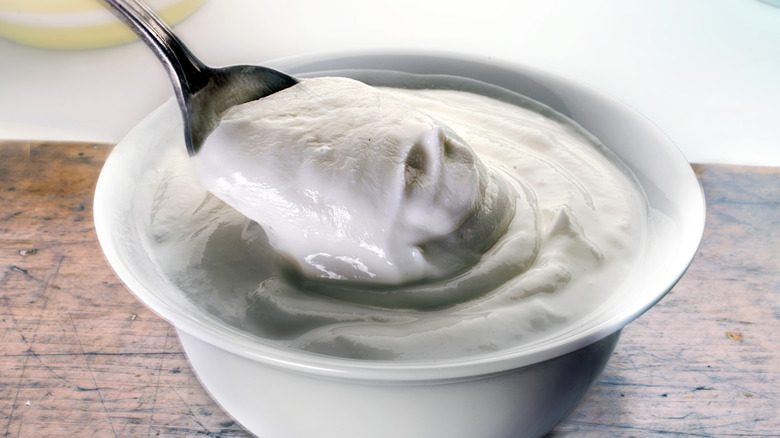The Mediterranean Breakfast That Has Two Eggs Worth Of Protein
By now, you're probably familiar with the health benefits of the Mediterranean diet, such as a lower risk of heart disease, reduced inflammation, and improved sleep. However, the Mediterranean diet isn't about eating more gyros and baklava. Instead, foods on the Mediterranean diet include legumes, fruits, vegetables, olive oil, and fatty fish like salmon. Refined grains, processed meats, and sugary foods are limited.
Thankfully, you can eat eggs on the Mediterranean diet, but you really want to limit your egg yolk consumption to one a day (though you can have unlimited egg whites). The egg yolk has half of the protein of the egg, so you'd need to eat twice the egg whites to get enough protein for a single egg. However, you can get more than 16 grams of protein at breakfast if you make Turkish eggs, which are cooked eggs served over savory Greek yogurt. In fact, Turkish eggs have the same amount of protein as if you were to eat two eggs.
Greek yogurt has more protein than an egg
Greek yogurt has a surprising amount of protein because the extra liquid and whey in regular yogurt is strained to make it a more concentrated source of protein. Calorie for calorie, low-fat Greek yogurt has 50% more protein than an egg, but with half the fat. Greek yogurt also has just 10 milligrams of cholesterol compared to the 186 milligrams in an egg.
(Here are some ingredients that can make Greek yogurt unhealthy.)
Combining an egg with Greek yogurt for breakfast gives you plenty of your necessary nutrients. Even though Greek yogurt has almost 4 grams of sugar, you'll get 115 milligrams of calcium (9% of your daily value) and 141 milligrams of potassium (3% of your DV). Eggs are also a great source of choline (27% of your DV) to improve your brain, heart, and liver function. Your eye health will benefit from the lutein and zeaxanthin in eggs. Additionally, breakfast with eggs and Greek yogurt will kickstart your day with plenty of B vitamins to fuel your body and brain.
How to make high-protein Turkish eggs
You don't need special eggs to make Turkish eggs, but you will need at least two regular eggs to make two servings of this Mediterranean breakfast dish. First, combine 2 tablespoons fresh chopped dill and ½ teaspoon fresh garlic in a bowl with ¾ cup of low-fat plain Greek yogurt. Add a dash of salt for flavor, or skip it if you're trying to watch your sodium. Let the mixture sit until it reaches room temperature.
Next, heat some olive oil over medium heat, then stir in some cumin and red pepper flakes (or Aleppo pepper, if you have it) until the olive oil is fragrant (about 30 seconds). Set the olive oil mixture aside in a bowl, then add enough olive oil back to the pan to fry the two eggs. You can fry just one side of the eggs until the whites are set, or flip the eggs if you like them a little more done.
Finally, spread the Greek yogurt mixture onto two separate plates, then top with the eggs. Drizzle the seasoned olive oil, and sprinkle more fresh dill, salt, or pepper on top.
One serving of Turkish eggs has a little more than 200 calories with almost 9 grams of heart-healthy unsaturated fats. This recipe is also keto-friendly with just over 4 grams of carbs. However, Turkish eggs are low in fiber, so you might need a serving of fruit, vegetables, or whole-grain toast to make this breakfast complete.


